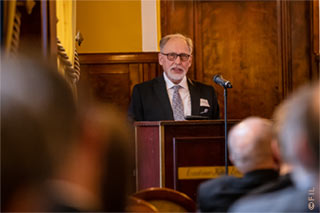More than 40 experts met on Tuesday for the 43rd symposium of the Research Institute for Leasing (FIL), an affiliate institute of the WiSo Faculty, under the motto "60 years of leasing in Germany - the significance of leasing for corporate financing". Institute Director Prof. Dr. Thomas Hartmann-Wendels, Chair of the Department of Business Administration and Banking, opened the symposium by welcoming all those present and briefly introducing the programme. He then raised the question of the extent to which leasing may have lost importance in the context of other financing options, as a preliminary evaluation of the annual financial statements of companies that prepare their accounts in accordance with IFRS suggests that the accounting requirement for lease liabilities associated with the new leasing standard IFRS 16 has led to a decline in leasing.
However, a respected study from 1984 could not confirm this: Leasing and credit are not substitutes, but complementary: if the interest in financing increased, there was also an increased demand for financing through leasing. Other advantages of leasing, such as included maintenance contracts and leasing tax saving models, certainly play a decisive role here, Professor Hartmann-Wendels summed up.
Mr Hartmann-Wendels then introduced Mrs.. Dr. Claudia Conen, Managing Director of the Federal Association of German Leasing Companies (BDL). Ms Conen explained the origins of the leasing financing model 60 years ago as part of the German economic miracle - a successful model in the private sector that quickly found its way into companies. Today, leasing is an integral part of corporate financing - so its impact remains highly significant.
Afterwards Mr Hartmann-Wendels referred to the FIL studies from a future perspective and predicted that the most important motives for leasing will remain unchanged. However, new challenges for the leasing business will also arise, for example from the fight against climate change, the sharing economy and digitalisation.
The current problems, also in the light of the Corona crisis and the war in Ukraine, as well as possible solutions were then discussed on the podium together with Prof. Dr. Michael Grömling, Head of the Research Group Macroeconomic Analysis and Business Cycle of the German Economic Institute in Cologne, and representatives from the leasing industry.
